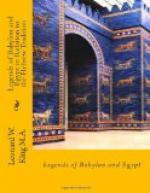The description of Ziusudu has also great interest in furnishing us with a close parallel to the piety of Noah in the Hebrew Versions. For in the Gilgamesh Epic and in Berossus this feature of the story is completely absent. We are there given no reason why Ut-napishtim was selected by Ea, nor Xisuthros by Kronos. For all that those versions tell us, the favour of each deity might have been conferred arbitrarily, and not in recognition of, or in response to, any particular quality or action on the part of its recipient. The Sumerian Version now restores the original setting of the story and incidentally proves that, in this particular, the Hebrew Versions have not embroidered a simpler narrative for the purpose of edification, but have faithfully reproduced an original strand of the tradition.
IV. THE DREAM-WARNING
The top of the Fourth Column of the text follows immediately on the close of the Third Column, so that at this one point we have no great gap between the columns. But unfortunately the ends of all the lines in both columns are wanting, and the exact content of some phrases preserved and their relation to each other are consequently doubtful. This materially affects the interpretation of the passage as a whole, but the main thread of the narrative may be readily followed. Ziusudu is here warned that a flood is to be sent “to destroy the seed of mankind”; the doubt that exists concerns the manner in which the warning is conveyed. In the first line of the column, after a reference to “the gods”, a building seems to be mentioned, and Ziusudu, standing beside it, apparently hears a voice, which bids him take his stand beside a wall and then conveys to him the warning of the coming flood. The destruction of mankind had been decreed in “the assembly (of the gods)” and would be carried out by the commands of Anu and Enlil. Before the text breaks off we again have a reference to the “kingdom” and “its rule”, a further trace of the close association of the Deluge with the dynastic succession in the early traditions of Sumer.
In the opening words of the warning to Ziusudu, with its prominent repetition of the word “wall”, we must evidently trace some connexion with the puzzling words of Ea in the Gilgamesh Epic, when he begins his warning to Ut-napishtim. The warnings, as given in the two versions, are printed below in parallel columns for comparison.(1) The Gilgamesh Epic, after relating how the great gods in Shuruppak had decided to send a deluge, continues as follows in the right-hand column:
SUMERIAN VERSION SEMITIC VERSION




